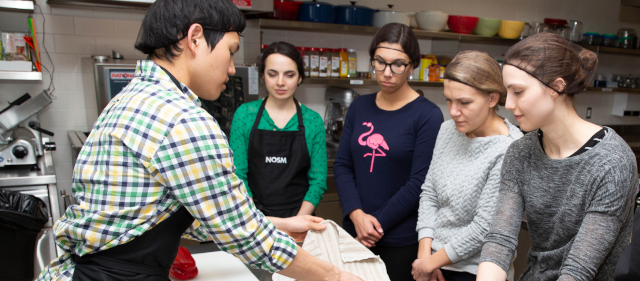This Sunday we a present something a little different. The Editor in Chief of the U.S. medical journal Obesity looks back over a 20 year career, and offers some unique observations. Her conclusion is to use ‘culinary medicine’ to treat and even cure obesity…
 A ‘Culinary Medicine Lab session at The Northern Ontario School of Medicine
A ‘Culinary Medicine Lab session at The Northern Ontario School of Medicine
(NOSM), where interdisciplinary programs are being leveraged
to help students understand complex issues…
A unique perspective
Editor in Chief Dr. Barbara Corkery, in a special anniversary Editorial, shares her thoughts on the avalanche of information (and speculation) offered by her journal’s contributors over the years about the causes and effects of obesity.
The bald truth (according to Corkery) about the causes of obesity:
- increased availability and marketing of high-calorie and high-glycemic-index foods and drinks,
- larger food portions,
- leisure time physical activities being replaced with sedentary activities such as watching television and use of electronic devices,
- inadequate sleep, and…
- the use of medications that increase weight.
Clearly, she says, obesity is beating mere humans’ best intentions by throwing at us a combination of powerful causal agents.
But wait…
Corkery also says, “However, if we use the principle of symbiosis and Darwin’s theory of evolution, perhaps we can understand obesity prevalence as an interim stage in the evolution of man reacting to his environment in order to gain long-term survival and ultimate longevity.”
Over the millennia, humans have found more and better ways to control the food supply and provide more and more reliable sources of calories for themselves than they’ve ever had before. We have no need to eat as much as we can, when it’s available, to store away a surplus for leaner times. But we still do, anyway. We’re wired for this reaction.
In simple terms, an abstract of the editorial explains: “[I]f we use the principle of symbiosis and Darwin’s theory of evolution, perhaps we can understand obesity prevalence as an interim stage in the evolution of man reacting to his environment in order to gain long-term survival and ultimate longevity.”
“Therefore the cause of obesity has as much to do as the human reaction to overfeeding as it does the production of foods that are being overfed,” says Corkery,
Earlier diagnosis and treatment key
Recognition of obesity as a disease, and earlier diagnosis of diabetes and other consequences of obesity, will support early and more effective treatment and prevention, the abstract proposes. “Importantly, disease recognition will help to support insurance coverage of effective obesity treatments,” Corkery p\hopes.
In addition, Corkery opines as, “Novel drug combinations are beginning to close the gap with bariatric surgery and appear to be very powerful new tools to treat obesity as a disease.”
But she also proposes elevating one currently marginal concept to mainstream status, as a means of applying a multi-disciplinary approach to the understanding of obesity and its consequences.
It’s called ‘culinary medicine’, which Corkrey says. “has the advantage of being an intervention that can be implemented at the earliest time point in the development of obesity with no negative side effects.”
What is ‘culinary medicine’?
It’s a unique (for now, anyway) initiative of the The Northern Ontario School of Medicine (NOSM), designed to, “engage and inform NOSM students on crucial topics such as diet fads, weight stigma and the science of nutrition.
The Culinary Medicine Lab (CML) is a collaborative pilot program between the Northern Ontario Dietetic Internship Program (NODIP), the Nutrition in Medicine Interest Group and Wellness Committee to offer informative and hands-on sessions on nutrition. Each two-hour session is facilitated by two Registered Dietitians (RDs) and two interns, and held in teaching kitchens at local secondary schools after NOSM classes.”
I think we should watch for ‘Culinary Medicine’ to pop up more and more in the future, as obesity and other points of focus in the medical sphere become more familiar with it, and learn how to do it better…
Muse on that…
~ Maggie J.

